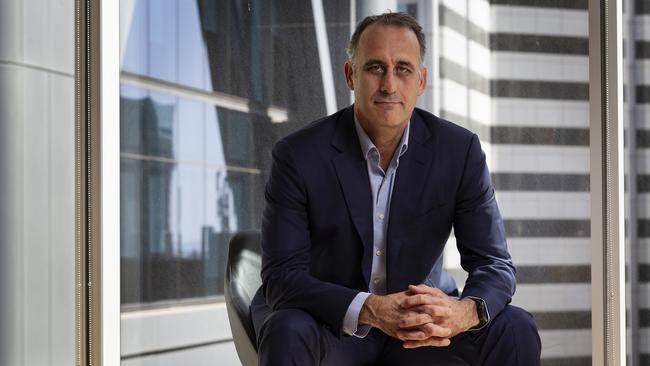Wesfarmers boss Rob Scott talks tough on Priceline owner API

Wesfarmers already owns 19.3 per cent of API. At best, Woolworths would be stuck with a recalcitrant shareholder that would have no interest in supporting its move.
The pitch from the Wesfarmers CEO was to API’s community pharmacists and Priceline franchisees. Yet the decision on any takeover will not be made by them. It is the board, on behalf of shareholders.
If the battles gets more willing, expect Wesfarmers to creep above its 19.3 per cent holding in API, perhaps up to 23 per cent.
In a release to the ASX, Scott makes it clear he will not be selling the stake to Woolworths. Truth in takeover rules means that Wesfarmers is now committed to holding that stake and could not sell to Woolworths even if the price was doubled.
The Woolworths offer of $1.75 a share may be subject to further due diligence on API. But if a firm offer from Woolworths is made, and accepted by the API board, Wesfarmers has the right to match that offer with a superior bid.
Consider the scenario where Woolworths buys about 70 per cent of the business at $1.75 a share, a full 20c higher than the Wesfarmers offer. API would remain a publicly listed company with all the rigmarole of reporting requirements and an activist 23 per cent shareholder on the register pressing for an independent chairman and directors.
“As a 19.3 per cent shareholder, we would vote against any Woolworths proposal,” Scott said.
“We would not sell our shares to Woolworths and as a major shareholder we would look to ensure that there was appropriate governance and separation in place between the supermarket and the pharmacists for the benefit of those pharmacists.”
At this stage in the contest, the two bidders are in very different positions.
If the API board accepts $1.75 a share from Wesfarmers, it could buy the whole business and take it private. Woolworths cannot. Moreover, Woolworths would have a 23 per cent shareholder on the register which in turn has a 4.9 per cent share in rival Coles and a deep knowledge of supermarket operations.
“At the moment we are the only party that is capable of getting to 100 per cent,” said Scott. “If they (Woolworths) wanted to go another approach, they would need to put in place a whole lot of arrangements to deal with the related party conflicts and independent directors to manage those conflicts.”
Scott is pushing the conflicts message hard. If a supermarket buys API, he argues, the pharmacy will always be the second priority. Franchisees and wholesalers don’t deliver 100c in the dollar of additional sales, unlike a supermarket’s own product.
Woolworths CEO Brad Banducci has stressed that the supermarket and pharmacy would be kept separate. “The rules are very clear: you can’t move a pharmacy into a supermarket. We have no plans to do that and we don’t think it would be the right thing from a customer perspective,” he has said.
In recent weeks, Scott and his team have spent time with API pharmacists and franchisees, who he says are concerned about the competition overlap between the supermarket aisles and front of store sales in pharmacies. No doubt Wesfarmers is doing its bit to stir the possum.
“When we owned Coles we saw first-hand how important the health, personal care and beauty categories were for supermarkets,” Scott said. “Every week at our trading meetings the category managers had a laser-like focus on what Priceline was doing, or what Chemist Warehouse was doing with a view of trying to capture more market share.”
The API board will want Wesfarmers to raise its bid. But the big westerner says Woolworths’ bid is indicative and there is nothing to match. Wesfarmers will probably need to raise its offer, but will argue a “superior bid” can be less than the hefty $1.75 because of ACCC and completion risk involved in going with Woolworths.
And its appeal to the API board will be that in an ESG world, directors need to consider all stakeholders, including the community. “The value and viability of API will ultimately be determined on whether community pharmacists continue to support their wholesale business and continue to support the Priceline franchise network,” Scott said.
However, there are other factors at play. Woolworths has deep pockets, despite its profit downgrade in Tuesday’s trading update.
Both suiters have correctly identified the healthcare, beauty and wellbeing sector as having huge investment upside. And assets are limited. This week’s monster bid for Swiss pharma Vifor by CSL and private equity firm BGH’s lunge at IVF provider Virtus follow HESTA’s investment in healthtech Citadel.
Woolworths’ surprise counter bid signals it likes the assets, and it is not keen for Wesfarmers to leverage its distribution system through API. What is that worth?




Rob Scott’s offensive on Wednesday was designed to show that Wesfarmers means business in its proposed takeover of API, the owner of Priceline. And that a rich counteroffer from Woolworths, 20c higher than Wesfarmers’ $1.55 a share, will never deliver the supermarket full control of API.